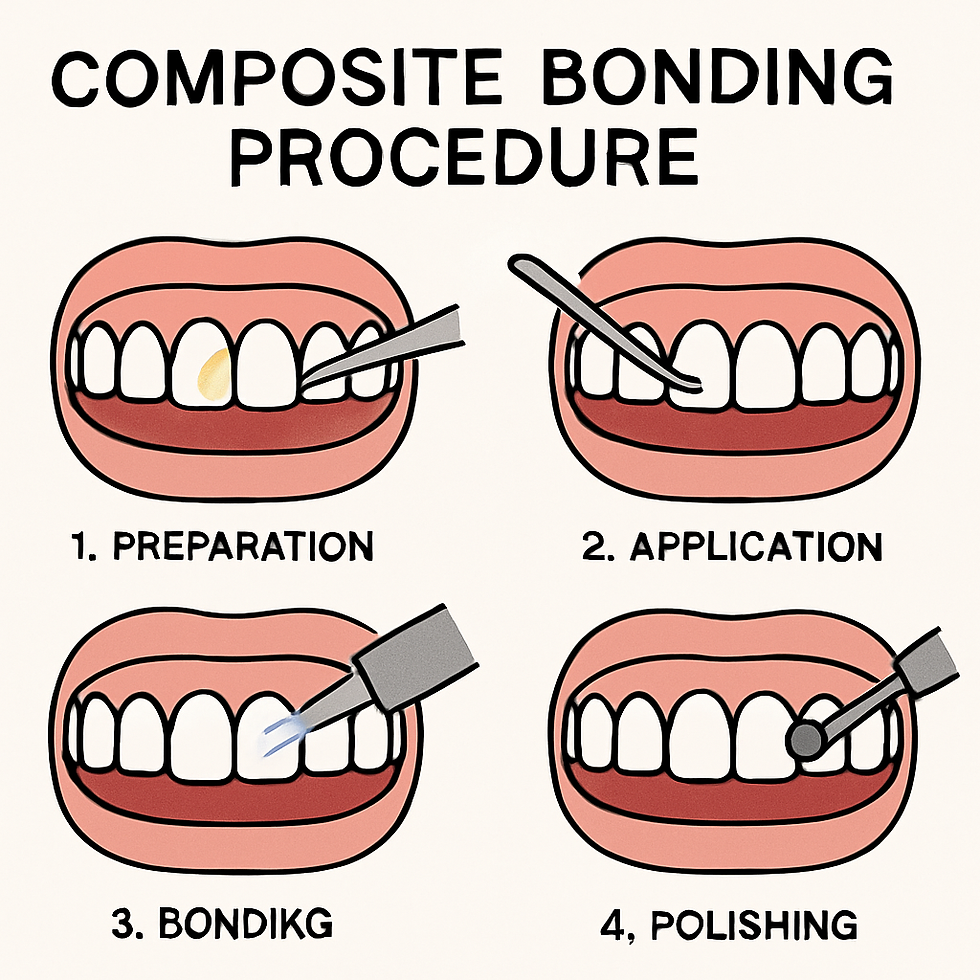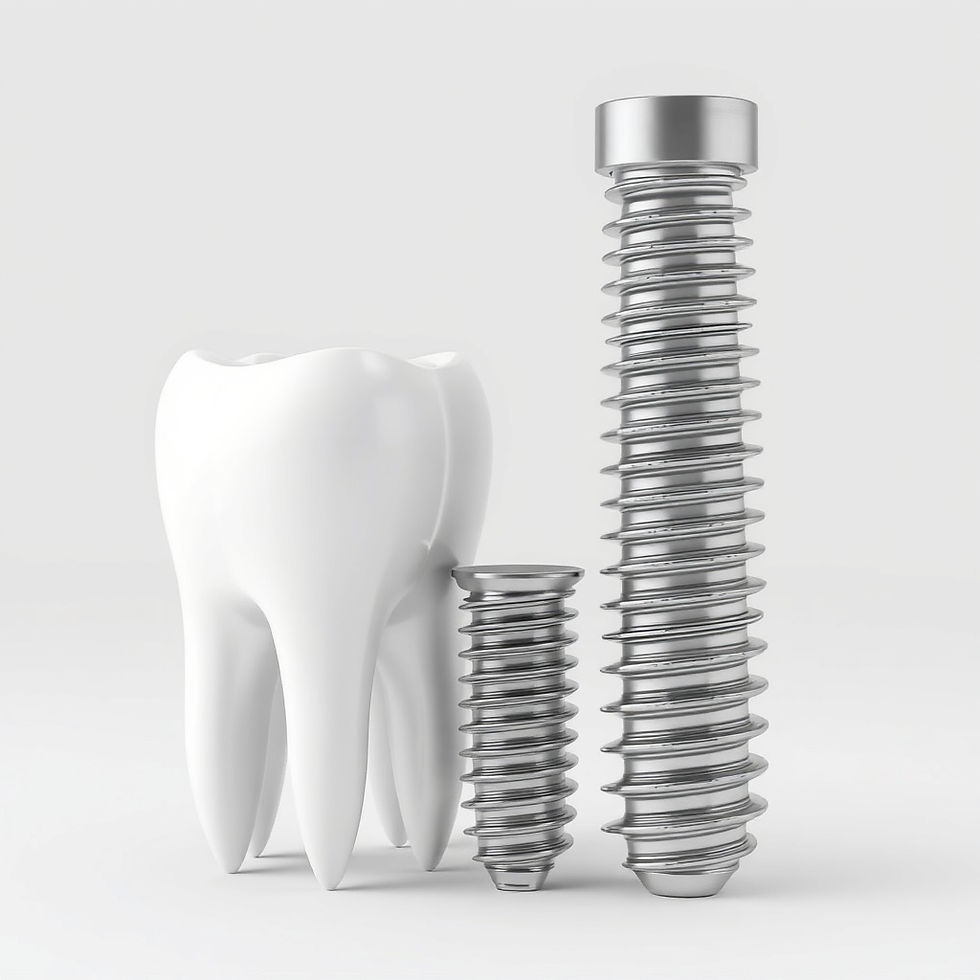Composite Bonding Teeth
- plurefy com
- Aug 19, 2025
- 8 min read

In the rapidly changing field of cosmetic dentistry, composite bonding stands out as a flexible and affordable option for improving the look of your teeth. As dental technology progresses, this procedure remains a popular choice for addressing common dental issues like chipped, discolored, or misshapen teeth. But what exactly is composite bonding, and why should you consider it? This detailed article will explore the advantages of composite bonding for teeth and how it can transform your smile, enhancing both your confidence and dental health.
Composite bonding, also known as dental bonding, is a cosmetic procedure where a tooth-colored resin material is carefully applied to the teeth to enhance their aesthetic appeal. This resin is expertly shaped and polished to match your other teeth, ensuring a natural-looking outcome. The simplicity and effectiveness of the process make it a popular option for dental patients seeking quick yet significant improvements.
Understanding the Materials
The composite resin utilized in dental bonding is crafted to closely resemble natural tooth enamel. This material is both durable and highly versatile, enabling dentists to mold and shape it according to each patient's specific dental structure. The ability to precisely match the resin's color to your natural teeth ensures a seamless and nearly invisible enhancement.
Composite Bonding Teeth - How the Procedure Works
The composite bonding procedure starts with the dentist choosing a resin color that closely aligns with your natural teeth. The tooth's surface is then gently etched to create a rough texture, enhancing the resin's adhesion. After applying a conditioning liquid, the dentist skillfully shapes the composite resin into the desired form. A special curing light is used to harden the material, followed by polishing the tooth to achieve a smooth, glossy finish.
Single Visit Solution
One of the most appealing aspects of composite bonding is its efficiency. Unlike other cosmetic dental procedures that might require multiple appointments, composite bonding is typically finished in a single visit. This means you can arrive at the dentist's office with a dental issue and leave with an improved smile on the same day.
Advantages of Composite Bonding Teeth
Composite bonding offers numerous benefits, making it a favored option for those wishing to improve their dental appearance. Let's explore these advantages.
Quick and Painless
One of the main benefits of composite bonding is its speed and ease. Unlike other cosmetic dental procedures such as veneers or crowns, composite bonding is usually completed in a single visit. The process is minimally invasive, often requiring little to no anesthesia, and is virtually painless for most patients.
Minimal Discomfort
Patients typically experience very little discomfort during the composite bonding procedure. Since it doesn't involve extensive drilling or significant alteration of the tooth's structure, it is generally pain-free. This makes it an ideal choice for those with dental anxiety or low pain tolerance.
Immediate Results
Another significant advantage is the immediate results. As soon as the procedure is completed, patients can see an improvement in their smile right away. This instant satisfaction is a powerful motivator for individuals looking to quickly enhance their dental appearance.
Zero Recovery Time
Composite bonding requires no extended recovery time. Patients can return to their normal activities immediately after the procedure, making it a suitable option for those with hectic schedules.
Cost-Effective Solution

Composite bonding is a more affordable option compared to other cosmetic dental treatments, making it perfect for individuals looking to enhance their smile without excessive spending. Although prices can differ based on the extent of work needed, composite bonding generally offers substantial savings over options like veneers.
Budget-Friendly Alternative
For many, the cost of cosmetic dental procedures can be a barrier. Composite bonding provides a cost-effective alternative, achieving impressive results at a fraction of the price of more extensive procedures. This affordability makes cosmetic dentistry accessible to a wider audience.
Insurance Considerations
Although dental insurance often does not cover cosmetic procedures, composite bonding may be partially insured if deemed necessary for dental health. It is important to consult with your dentist and insurance provider to find out what portion of the expenses, if any, can be covered.
Long-Term Savings
Investing in composite bonding can result in long-term savings. By addressing minor dental issues early with bonding, you may avoid the need for more expensive treatments in the future, such as crowns or implants, which can become necessary if dental problems are not addressed.
Natural Appearance
The composite resin used in dental bonding is designed to mimic the natural appearance of tooth enamel. Dentists carefully select the color and shape the resin to blend perfectly with your existing teeth. The result is a natural-looking smile that enhances your overall look without seeming artificial.
Seamless Integration
One of the key advantages of composite bonding is its ability to integrate flawlessly with your existing teeth. Dentists precisely match the resin to your natural tooth color, ensuring the enhancements are virtually invisible to the naked eye.
Enhancing Confidence
A natural-looking smile can greatly boost your confidence. Being assured that your dental work is undetectable allows you to smile freely without the worry of judgment or the appearance of artificial changes.
Customizable Results
Composite bonding offers a high level of customization. Dentists can adjust the resin's color, shape, and texture to achieve the desired result, ensuring that each patient's unique needs and aesthetic goals are met.
Versatility
Composite bonding is highly versatile and can address a variety of dental issues. Whether you have a chipped tooth, gaps between your teeth, or discoloration, composite bonding can provide a solution. It can also be used to alter the shape or length of your teeth, giving you more control over your smile's aesthetics.
Comprehensive Solutions
Whether you're dealing with minor imperfections or more noticeable issues, composite bonding offers comprehensive solutions. From correcting small chips to closing gaps and even reshaping teeth, this procedure can address a wide range of dental concerns.
Personalized Approach
Each composite bonding treatment is customized to meet the unique needs of every patient. Dentists collaborate closely with patients to understand their objectives and modify the procedure accordingly, ensuring the outcome matches the patient's expectations.
Adaptable to Future Changes
The flexibility of composite bonding allows for adjustments if your dental needs change over time. This adaptability enables continuous customization as your smile develops.
Preservation of Tooth Structure
Unlike veneers or crowns, composite bonding requires minimal alteration to the natural tooth structure. This means more of your original tooth is preserved, which is beneficial for overall dental health. The procedure is reversible, allowing for future adjustments or changes if desired.
Minimal Invasive Nature
The minimally invasive nature of composite bonding is a significant advantage. By preserving more of the natural tooth structure, the risk of damage or complications is reduced, supporting the long-term health of your teeth.
Long-Term Benefits
Preserving the natural tooth structure offers long-term benefits for dental health. Maintaining the integrity of your teeth helps prevent issues like sensitivity and decay, which can arise from more invasive procedures.
Reversibility
The reversibility of composite bonding offers reassurance. If you decide to alter or remove the bonding at any time, it can be done with minimal effect on your natural teeth, allowing you the flexibility to adjust your smile as you wish.
Quick Recovery
Composite bonding involves minimal invasion, leading to a fast recovery. Patients can immediately return to their usual activities after the procedure. Maintaining good oral hygiene and avoiding habits that might harm the bonded teeth, like nail biting or chewing hard objects, is crucial.
Immediate Return to Routine
One major benefit is the ability to resume your normal routine right after the procedure. Unlike more extensive dental treatments, there's no need to take time off work or restrict your activities after composite bonding.
Post-Procedure Care
Even though recovery is rapid, following post-procedure care instructions is vital to preserve the longevity and appearance of the bonded teeth. This includes maintaining good oral hygiene and attending regular dental check-ups.
Avoiding Harmful Habits
To maintain the longevity of composite bonding, patients should steer clear of habits that may harm the resin. This includes not biting hard objects and limiting the intake of stain-causing substances to preserve the appearance of the bonding.
Considerations for Composite Bonding Teeth
Although composite bonding has many advantages, there are some factors to consider before choosing this procedure.
Longevity
Composite bonding is durable but not as long-lasting as other cosmetic options like veneers or crowns. Typically, bonded teeth last between 5 to 10 years with proper care. Regular dental check-ups and good oral hygiene can help extend the life of your bonded teeth.
Expected Lifespan
Knowing the expected lifespan of composite bonding helps set realistic expectations. With proper care, the bonding can last for several years, but it may eventually need touch-ups or replacement.
Maintenance Tips
To maximize the longevity of your composite bonding, it's important to maintain a regular dental care routine. This includes brushing twice daily, flossing, and attending regular dental appointments to monitor the condition of the bonded teeth.
When to Consider Replacement
If the bonding becomes worn or damaged over time, it may need to be replaced. Your dentist can advise on when replacement is necessary and provide guidance on maintaining the overall health of your teeth.
Staining
Composite resin is more prone to staining than natural teeth or porcelain veneers. To keep your bonded teeth looking their best, it's advisable to limit consumption of stain-causing substances like coffee, tea, red wine, and tobacco. Regular cleaning and polishing by a dental professional can also help manage discoloration.
Managing Discoloration
To manage potential discoloration, patients should be mindful of their dietary habits. Limiting the intake of stain-inducing foods and beverages can help maintain the color and appearance of the bonded teeth.
Professional Cleaning
Regular professional cleaning and polishing can help maintain the appearance of the composite bonding. Dental professionals can remove surface stains and keep the bonding looking fresh and natural.
Lifestyle Adjustments
Making small lifestyle adjustments can significantly impact the longevity and appearance of composite bonding. This includes quitting smoking and using a straw when consuming beverages that can stain teeth.
Not Suitable for Extensive Repairs
Composite bonding is ideal for minor cosmetic changes. However, for extensive damage or decay, other treatments such as crowns or veneers may be more appropriate. A dental consultation is necessary to determine the best option for your specific needs.
Evaluating Dental Requirements
Prior to starting composite bonding, it's essential to evaluate your dental requirements. A comprehensive examination by a qualified dentist can determine if bonding is appropriate or if more extensive treatment is needed.
Recognizing Limitations
Recognizing the limitations of composite bonding is vital for making an informed choice. Although it is suitable for minor improvements, more significant repairs might necessitate alternative treatments for the best results.
Considering Alternative Solutions
If composite bonding doesn't meet your needs, your dentist can advise you on alternative solutions. This may involve veneers, crowns, or other cosmetic treatments that better address your dental issues.
The Importance of Choosing a Qualified Dentist

by Ozkan Guner (https://unsplash.com/@dentistozkanguner)
Choosing a skilled and experienced dentist is essential for achieving the best results with composite bonding. A qualified dentist will thoroughly evaluate your dental needs, suggest the most appropriate treatment options, and perform the procedure with accuracy. This ensures your smile not only looks great but also functions properly.
Expertise and Experience
Selecting a dentist with expertise and experience in composite bonding is vital for obtaining the best possible outcome. Experienced dentists possess the skills and knowledge to execute the procedure effectively, ensuring a natural and aesthetically pleasing result.
Personalized Care
A qualified dentist will offer personalized care by taking the time to understand your specific dental needs and aesthetic goals. This tailored approach ensures that the treatment is customized to your unique requirements, resulting in a smile you are proud to display.
Ongoing Support
Following the procedure, a qualified dentist will provide ongoing support and guidance to help you maintain the results. This includes regular check-ups and advice on caring for your bonded teeth to ensure their longevity and appearance.
Conclusion
Composite bonding teeth provides numerous advantages for individuals looking to enhance their smile. Its fast, painless, and cost-effective nature makes it a favored option in cosmetic dentistry. Whether you're facing minor chips, gaps, or discoloration, composite bonding offers a natural and appealing solution.
If you're thinking about cosmetic dentistry to improve your smile, composite bonding might be the ideal choice for you. Consult with a dental professional to explore your options and learn how composite bonding can enhance your dental aesthetics. By understanding the procedure, its benefits, and considerations, you can make an informed decision that aligns with your dental goals and lifestyle.










Comments